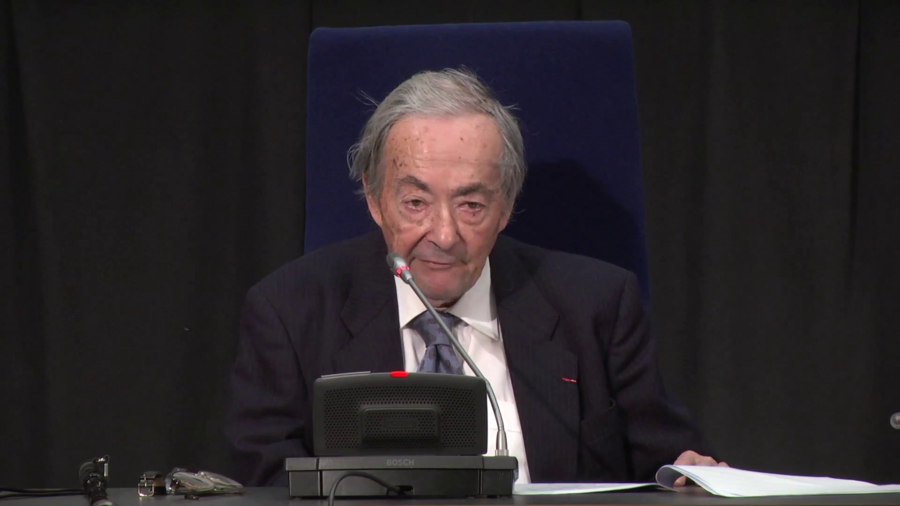[This portion of Steiner’s Lecture “Universitas?” was published to YouTube as the first of three parts, with it unclear if they were contiguous, so they are also presented here individually.]
George Steiner: The exponential—there is no other word. The explosion of science and technology has transformed not only our universities but after Descartes and Leibniz the very status of knowledge and of truth. The exact and applied sciences with their inbuilt axiom of progress. Isn’t it fantastic? We will know something tomorrow which we did not know today. Think of that for a moment. Even a mediocre science équipe will know something next Monday which they did not know today. The escalator of science is always moving upward. They have created new universities within the university. Their budget—I don’t need to say that to rectors and deans, but their budget is a hundred-fold what was the budget of the humanities. In a ranking American Ivy League university, the cost of controlling the temperature of the high-energy laboratory is now greater than the cost of the entire university budget ten years ago. In ten short years. In science faculties, salaries and prestige are far in excess of those current in non-scientific departments. I love to point out Berkeley in California has a faculty parking space. And one part of it is reserved for Nobel laureates. [audience laughs] Part of the parking space. They have that many at Berkeley. Just think of it.
Biogenetics seeks access to the mechanism of life itself. Advances in medicine are virtually inconmesurable. And yet. And yet—mais—that little French word, “mais.” Or the German word “aber.” Aber.
And yet, our wars are as barbaric as ever, famine and enslavement, forced migration, abound. Forty million children are now near the hunger line. Forty million children. Economics neither foresaw, nor is helping us in the present crisis of late capitalism. The mental stress, the sadness in the psyche, the criminality which characterize so much of our urban and familial existence; the hysterical flight into narcotics, and hypnosis of the mass media have proved resistant to scientific triumphs and their credo of enlightened rationality. In the greatest age science has ever known, there is more misery on our streets, there is more mental collapse, than ever before.
There is a stubborn enigma here. A partial answer may lie in the gap of understanding which now separates scientific knowledge and methods from general and public grasp. You at Tilburg are trying to handle this deep gap. Not only, as Galileo proclaimed, does nature speak mathematics, but the evolution of that language has excluded common sense comprehension. You and I still speak of sunset and sunrise in a Ptolemaic use of language, centuries after Copernicus and Newton. It’s of course total nonsense. But we still use it continually.
We dwell amid archaic fictions of solid objects. This table, we are told, is a vortex of electrons in quantum motion. But the causes may lie deeper. Science has since Euclid prided itself on its ideological and political abstentions, on its neutrality in respect of social and political conflicts. It has cultivated what Kant calls, wonderfully, “disinterestedness.” Noli me tangere, I’m doing science. Don’t interfere with political or social concerns. Noli me tangere.
Its involvement in warfare or Stalinist madness have been contentious and self-destructive. Heidegger, God help us, put it with majestic insolence. I quote, “Science does not think.” Die Wissenschaft denkt nicht. You had to be Heidegger to be able to say that. [audience laughs] But it is a very deep piece of…idiocy. It’s a piece of idiocy but it’s very deep. This is one of the hardest things to handle: deep idiocies.
Do the humanities think? The proud phrase literae humaniores, the humane letters. Menschlichkeit. L’humanité, humanitas. Their condition—forgive me, and I don’t want to cause any offense. But their condition is not resplendent. A fair number of undergraduates in self-entitled universities, which are actually vocational or trade schools promoted to a fake rank, verge on sub-literacy. I’m sorry.
[The second portion of this lecture can be found here.]
